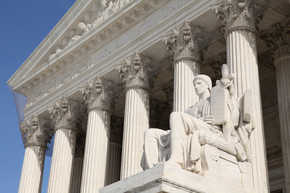 President Barack Obama is a shoo-in for a second term in the White House in November after the nine-member Supreme Court of the United States ruled 5 to 4 on June 28 that his crafted landmark healthcare reform act was constitutional.
President Barack Obama is a shoo-in for a second term in the White House in November after the nine-member Supreme Court of the United States ruled 5 to 4 on June 28 that his crafted landmark healthcare reform act was constitutional.The long-awaited ruling was a crushing defeat for presidential candidate Mitt Romney. He had argued daily that the healthcare act was unconstitutional and if elected, he would work to strike it down.
However, after the 10 a.m. Thursday court announcement, Romney's camp told the media it would not publicly criticize the ruling.
The five justices who ruled in favor of the legislation were John Roberts, Ruth Bader Ginsburg, Stephen Breyer, Sonia Sotomayor and Elena Kagan. Writing the dissent was the court's key swing-voter, Anthony Kennedy, joined by Antonin Scalia, Clarence Thomas and Samuel Alito.
Scalia was the most vocal of the justices. He had previously commented publicly and vigorously on the alleged shortcomings of the act. But on Thursday, Chief Justice Roberts said the 5-4 vote was "sufficient to sustain it."
One of the court's most conservative justices, Roberts said. "It is not our role to forbid it or to pass upon its wisdom or its fairness." He wrote the deciding opinion.
The court ruled Congress acted within its power when it required almost all Americans to have health insurance starting in 2014 or pay a penalty -- an action that does not violate the Constitution.
That was the most controversial aspect of the act. Over the past year. It had generated fierce pros and cons from legislators and citizen groups throughout the nation. The Affordable Care Act, passed in 2010, guarantees all Americans health care.
The court found Congress could impose the mandate under its authority to levy taxes.
The court also ruled Congress acted constitutionally in expanding Medicaid under the act, but warned that if states do not comply with the expansion provisions, the federal government could only withhold new funds, not existing funding.
Roberts ruled, "Nothing in our opinion precludes Congress from offering funds under the (Affordable Care Act) to expand the availability of health care, and requiring that states accepting such funds comply with the conditions on their use.
"What Congress is not free to do is to penalize States that choose not to participate in that new program by taking away their existing Medicaid funding."
The winners and losers in the historic court decision are:
The Winners
- President Obama, of course. The ruling validates Obama's most visible and far-reaching domestic achievement to date. It also decimates the Radical (read that as Republican) Party's daily charges that the Obama Administration has consistently overreached its authority.
- The sick and the uninsured. The Affordable Care Act will extend health insurance to some 30 million Americans who currently lack coverage. It will also guarantee the availability of insurance for those with pre-existing conditions and ensure those people don't pay more than healthy people.
- The poor. Anyone earning up to 133% of the federal poverty level will get free coverage through Medicaid and those earning 133% to 400% (but without access to employer or government insurance) will be eligible for federal subsidies to help them buy policies.
- Congressional Democrats. Democratic Senators and House members who voted for the law won't have to defend themselves against charges that they ran roughshod over the Constitution.
The Losers
- Mitt Romney, of course. However, he can now put his own positive spin on the ruling by telling supporters the only way they can still fight Obamacare down the road is by electing him in November.
- Congressional Radicals (Republicans). They can tell voters they tried their best to get rid of Obamacare, but failed. Still, like Romney, members of Congress up for re-election this fall can argue the only way to get rid of (or slow) Obamacare is to vote for them.
- Republican Governors. The Affordable Care Act is a federal law, but it is written to be largely administered at the state level. Most states with Republican governors have delayed steps to implement the law while they waited to see what the Supreme Court would do. Many Republican states also decided not to begin setting up health insurance exchanges, the marketplaces where federal subsidies will be doled out, and where individual and small group insurance policies will be sold.
- Young Americans. Many are expected to pay more into the insurance pool than they get out, to help subsidize the cost of insuring older, sicker people. Still, if they are under 26, they can get insured through their parents' plans.

 By
By 